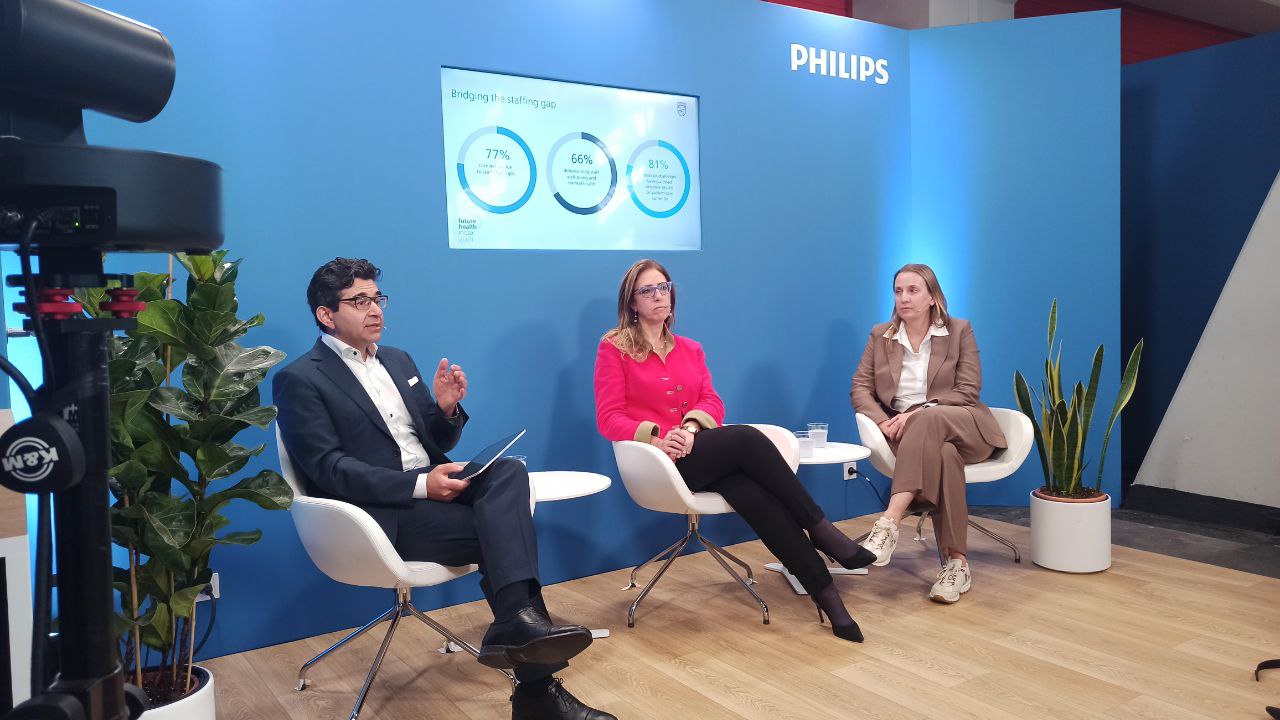85% of Healthcare Leaders Investing or Plan to Invest in Gen AI, According to the Largest Survey
Among many important helathcare tech topics discussed at the inagural HLTH Europe 2024 conference taking place on June 17-20 in Amsterdam, generative artificial intelligence (AI) has seemingly taken the central stage.
A first day panel discussion "ChatGPT in the hospital: Helping hand or unhelpful hindrance?" shed some light on the opportunities and challenges of incorporating generative AI into the worflows of healthcare organizations, both for clinical and administrative use cases.

HLTH Europe 2024. Image credit: Andrii Buvailo
According to one of the panelists, Dr. Haris Shuaib, Founder & CEO at Newton's Tree, the crucial issue with generative AI is inherent black box effects and probabilistic nature of outputs, which presents major challenges. However, he believe that the solution comes in a form of additional layers of governance, quality control and supervision, which can make the inherently unstable LLMs for instance still be massively useful and reliable in the healthcare setting. He noted that, for instance, some MRI specialists might not entirely understand how MRI technology works under the hood, but still operate the equipment in a reliable and professional manner. Why is that? Because of the layer of controls, procedures, standard practises and supplier's protocols guiding the process of using the quipment for the purpose. Similar thing can apply to black box generative Ai, which can be incorporated into a framework of procedures and controls, guding the outputs towards reliability and robust operation overall.
Another panelist, Shez Partovi, Chief Innovation & Strategy Officer and Chief Business Leader for Enterprise Informatics at Philips, highlighted that when thinking about the strategy of applying generative AI in the healthcare organizations, including hospitals, it is important to focus not only on clinical use cases, but potentially more impactfully -- on administrative and operational processes, where the degree of risk is much lower compared to, say, diagnostics or prescription scenarious, but the overall impact could be significant for the organization.
Mr. Partovi highlighted a near term possibility where an entire hostpital's data infrastructure can become "live" with the help of generative AI and other technologies, such that it would theoretically be possibel to "talk" to hostpital and get whatever information is needed by a clinician or an administrator, such as "how many MRI scans were performed last week." All that in a form of an interactive chat, rather than a legacy dashboards.
Importantly, Arnaud Wilmet, Chief Medical Information Officer EMEA at Microsoft, pointed out a scenario where generative AI can also empower the patients by democratizing access to their own data and helping them understand what is going on with their treatment, the meaning of diagnostic tests and prescription interventions, and so on.
So, an important use case of generative AI is also educating patients to some extent about their health and the interaction with healthcare system, giving them more power and invovement into their treatment process. A typical doctor can only spend so much time for explaining a patient what is happening, but if there is a digital twin of the patient, including all the data from accross the history of their medical treatment, a patient can talk to his ditial twin in a form of ChatGPT question and answer for as long as they need to understand the situation.
Healthcare Leaders Turn to AI to Address Critical Gaps in Patient Care
A trove of insights came from the announcement of the Future Health Index (FHI) by Royal Philips (NYSE: PHG, AEX: PHIA). This annual report, now in its ninth edition and currently the largest study of its kind, highlights the increasing reliance on virtual care and AI-enabled innovations to address significant challenges in the healthcare sector, such as workforce shortages, financial burdens, and growing demand for services.
Some key highlights fron the FHI 2024 report:
- AI and Automation: An overwhelming 92% of healthcare leaders believe that automation is crucial for addressing staff shortages by reducing the administrative burden on healthcare professionals. However, 65% of these leaders acknowledge skepticism among healthcare staff regarding the use of automation.
- Virtual Care: Nearly 89% of healthcare leaders have observed a positive impact of virtual care in easing staff shortages, improving patient care delivery, and enhancing staff satisfaction.
- Generative AI: The report indicates a significant interest in generative AI, with 85% of healthcare leaders currently investing in or planning to invest in these technologies to enhance clinical decision support and patient monitoring.
- Staffing Challenges: Approximately 66% of healthcare leaders report increased burnout and mental health issues among their workforce, underscoring the need for digital solutions to improve efficiency and reduce workloads.
- Financial Sustainability: Financial challenges are affecting patient care, with 81% of leaders noting an impact due to limited resources. Strategies to address these challenges include embracing subscription-based models for healthcare technology to reduce upfront costs.
The FHI 2024 discussion was hosted by Shez Partovi, who was joined by Dr. Chiara Bucciarelli-Ducci, CEO of the Society of Cardiovascular MRI and Cariology Consultant at the Royal Brompton and Harefield Hospitals in the UK, and Dr. Marlies Schijven, professor of Digital Health at the University of Amsterdam and a surgeon at the Amsterdam University Medical Center. They provided insights into the report's findings and discussed the potential of digital innovations and AI in transforming healthcare delivery.
Commenting to BiopharmaTrend, Shez Partovi highlighted that the implementation of generative AI is quite different from good old software component, speaking in terms of business model. While traditional software is essentially a "click and forget" process in terms of implementation with relatively low burden for maintanance, the implementation of AI systems is a kind of moving target, a never ending journey where the models are constantly updated, retrained and improved on regular bases, positioning the technology providers as strategic partners to healthcare organizations, unlike much less involved traditional software providers. This new paradigm certainly adds new level of complexity and risk management needs to the strategy of modern-day healthcare organizations.

HLTH Europe 2024. Image credit: Andrii Buvailo
The FHI Newscast was attended by 10-12 reporters in person, and nearly 300 C-suite leaders, reporters, and influencers from around the world joined the live stream on LinkedIn Live. The event included a comprehensive discussion on the critical gaps identified in the Future Health Index 2024 report and strategies to bridge these gaps through innovative solutions.
“Increasingly, we’re seeing long wait times and staff shortages making it difficult for people to get timely access to care when and where needed. The Future Health Index 2024 global findings show health leaders believe these barriers to access to quality care are getting larger,” said Shez Partovi. “This year’s report shows how innovations including AI are helping to free up time for staff and reduce wait times for patients. However, as health systems roll out AI tools to save time and reduce barriers to care, it’s critical to bring staff along on the journey to ensure an inclusive AI rollout with patient and clinician experience is at the forefront.”
"The results of the FHI Report and the 3 critical gaps identified align perfectly with the challenges I face in my clinical practice each day. The staffing gap is the most concerning aspect as it has a direct negative impact on patient care. As health leaders, we need to focus on increasing the adoption of digital technologies to improve efficiency and reduce the workload, but not without engaging with healthcare staff to ensure adoption of these technologies is embraced,” said Dr. Chiara Bucciarelli-Ducci.
Topics: HealthTech